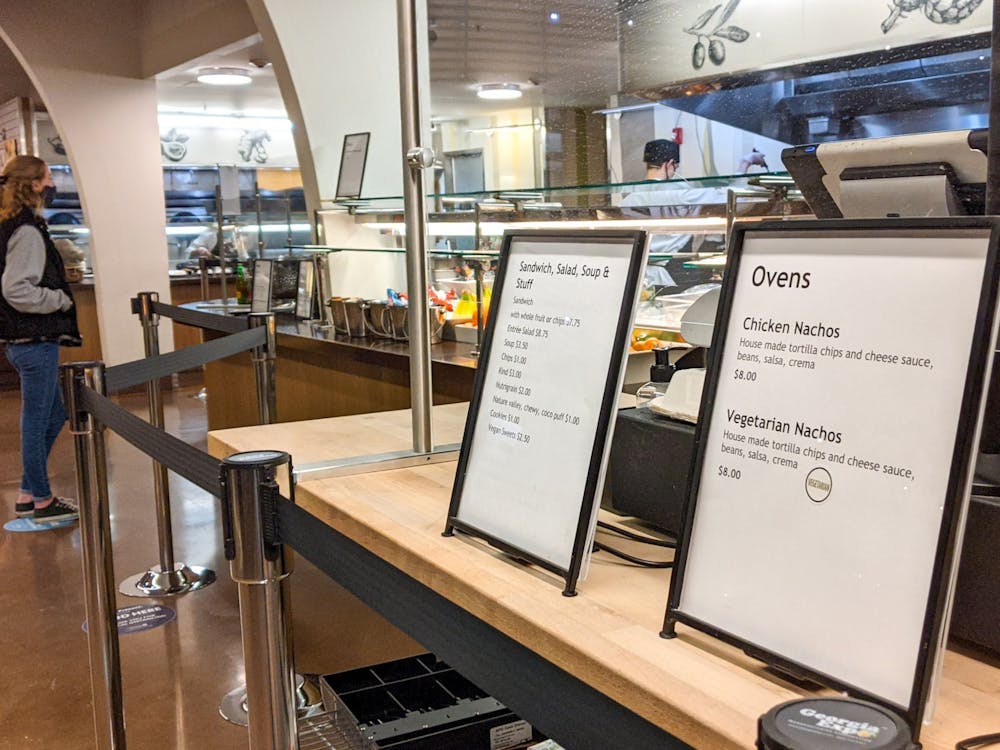When you hear the words “food waste,” where does your mind take you? Do you reflect on your purchasing, eating, or disposal habits? Do you think about the millions of people suffering from food insecurity or even the additional greenhouse gas emissions added to the atmosphere?
Globally, about one billion tons of food, or approximately one third of all produced food, is lost or wasted each year. Yet in 2021, about 828 million people were affected by food insecurity. How can so many humans suffer from food insecurity when 1 billion tons of food are wasted? The answer is quite simple. We are overconsuming more than we can eat, starting from purchasing to the actual consumption of food.
In 2019, the University of Portland produced 600 to 700 pounds of waste per day across the Pilot House, Bauccio Commons and the Anchor. This means the University of Portland generated more than 150,000 pounds of food waste by the end of 2019. Unfortunately, this number does not include the hundreds of pounds of food that are thrown away in other bins throughout campus.
The collected food waste is picked up by Waste Management to be broken down at anaerobic digestion facilities to create methane. We are lucky to have access to more environmentally friendly disposal options such as “food waste only” and recycling bins, however, these actions do not tackle the root of the problem and only slightly reduce the University’s environmental impact.
As many of us are learning more about the impacts of climate change, the reality of these negative effects is becoming more real and permanent.
Climate change is a complicated and comprehensive change in the earth’s temperatures and weather patterns. Humans have exacerbated climate change by burning excess amounts of fuels, generating greenhouse gas emissions. Food production is the leading contributor of greenhouse gases, and according to many sources, food waste contributes to over eight percent of global greenhouse gas emissions.
In the United States alone, 119 billion pounds of food is wasted, which is about 40% of all food. Café Bon Appétit, the University of Portland’s catering partner, has this statistic along with other sustainable issues they are addressing on their website.
Bon Appétit states that they have reduced their food waste by 30% in 2007, but how can the University of Portland contribute over 100,000 pounds of food waste in just one year? The portion sizes served at both the Pilot House and Commons vary from meal to meal, sometimes having “abnormally large portion sizes” or “not worth the cost sizes.” The ratio between main dishes and supporting foods is disproportionate, leading to an increase in wastage in certain types of foods like rice and fries.
When I go to Commons for a “global” meal, I am often served two to three scoops of rice with only one small scoop of vegetables and the main dish. I grew up in a household that does not waste food, but I find it difficult to finish every piece of the meal.
Generally, from a female’s perspective, the average portion size seems to lean towards the “typical, American, white, male.” While in a male’s perspective, the average portion size is slightly too small. Everyone eats different amounts of food and wants to be full, not overstuffed.
A solution to this issue is reducing the cost of food and initially reducing portion sizes for certain types of foods, allowing the option for seconds on certain types of foods such as pasta and fries. When students have the option to ask for more food, they have the ability to control how much food they are eating and can get more food if needed. This addresses the issue of food waste at its roots.
The cost of meal plans is changing every year, getting more expensive, which causes students to generally want more for their money. It is a common sentiment for students to want more than they can eat per meal, so they can get “their money’s worth.” This leads to the overconsumption of food and hundreds of pounds of food that get thrown away. By slightly reducing the costs of food, students will not feel the need to take more than they need. When a new program is rolled out, more people are inclined to take advantage of the opportunity, but as time goes on people begin to settle down.
This solution is an all-around win-win solution for consumers, the environment, and Bon Appétit. Consumers will be paying less for more proportional amounts of food, hopefully wasting a minimal amount, while Bon Appétit is saving money by spending less on purchasing food and earning more profits when students do not ask for additional food. At the University of Portland, we will be uniting to change this issue.
When addressing climate change, it can often feel overwhelming, discouraging and hopeless seeing all the negatives, but breaking it down and being proactive on sustainable solutions will make positive differences. We must remember that advocating and creating change is not an easy task, but collective efforts will forge the positive changes we need to save our environment.
At the University of Portland, we must come together and act now to change and reduce our unsustainable habits. Simply reconsidering purchasing habits, changing portion sizes and reducing our food waste will make a significant difference in the amount of greenhouse gas emissions we are contributing to the atmosphere.
Cherisse Wong is a freshman business student at the University of Portland. She can be reached at wongc26@up.edu.
Have something to say about this? We’re dedicated to publishing a wide variety of viewpoints, and we’d like to hear from you. Voice your opinion in The Beacon.








